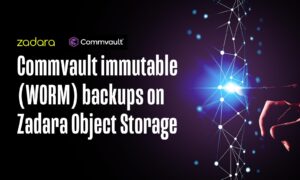The hybrid cloud is the industry’s response to the control and security of onsite storage and the convenience and flexibility of the cloud. Enterprises can develop a sound, reliable, affordable IT infrastructure, without giving up the ownership, control, and visibility that comes with on-premises storage and applications. What are the most compelling arguments for migrating to a hybrid enterprise cloud storage infrastructure?
1. Security
Time has proven that enterprise data and applications are at least as safe in the cloud as they are onsite, and in many instances even safer. Cloud services make security a #1 priority, whereas enterprise IT departments generally focus on operations first, leaving security as an afterthought.
One of the largest obstacles when it comes to moving enterprise data storage and applications to the cloudhas always been security. However, time has told that the cloud is as secure as, and in many cases more secure than, on-premises storage. The hybrid cloud gives the business the ideal mix of off-premises storage and support with on-premises security and ownership.
2. Flexibility & Scalability
When only on-premises storage is utilized, IT hardware, networking equipment, and staff are necessary any time that the systems grow or change. Conversely, the hybrid cloud grows with the needs of the company, and when less is needed, the system can be scaled down for cost savings. This makes an ideal development and testing environment for enterprises working on software development and other in-house solutions. It’s also perfect for e-commerce, where demand frequently expands and contracts, as well as in other situations that demand agile scalability and flexibility.
3. Visibility & Transparency
With the hybrid cloud, IT and the executives can maintain the same level of transparency and visibility into the IT infrastructure that they can in house. The primary difference is that the cloud service provider takes over a lot of the so-called grunt work associated with daily storage, data management, security, backups, networking issues, etc.
4. Affordability
Since the hybrid cloud drastically reduces the enterprise’s dependence on internal IT hardware, software, staff, etc., the costs associated with collecting, storing, and managing growing data sets is significantly lower. In an age where top IT talent is in short supply, the labor savings alone can often justify migration to the hybrid cloud.
5. Consistency
Since the enterprise retains control of its data and applications in the hybrid cloud, it is easy to maintain data governance policies, data access, user authorization, and other issues across the IT infrastructure. Enterprise cloud storage is also ideal for centralizing data storage and controlling data access.
6. Speed & Performance
The hybrid cloud can be used to move some services offsite, allowing for greater speed and performance by the smart allocation of IT resources.
By employing the hybrid cloud, the enterprise can better manage their IT resources. Demand that surpasses the internal capabilities can be transferred to the cloud service provider. For example, a tremendously popular website can be hosted by the cloud service, whereas the internal operations can be housed on premises. This allows IT to optimize the resource use for better speed and performance across the enterprise.
7. Reliable Recovery
If all of the data and applications are hosted in house, a significant weather event, earthquake, or any other event or natural disaster can shut down operations entirely. But with a hybrid cloud solution, all or most of the operations can be kept available in the cloud, even when onsite facilities are facing problems like power outages, Internet connectivity issues, and other issues associated with natural and other disasters. In many cases, the hybrid cloud environment can be used to deliver IT services to an entirely different facility when primary facilities are shut down.
8. You Aren’t Boxed In
A hybrid cloud doesn’t hamstring IT into an all-cloud or all-on-premises infrastructure. It offers the ideal balance of availability, affordability, and convenience. Find out how the hybrid cloud can benefit your organization when you download our latest analyst paper: Zadara Storage Voted by IT Pros as On-Premise Enterprise Storage-as-a-Service Market Leader.







